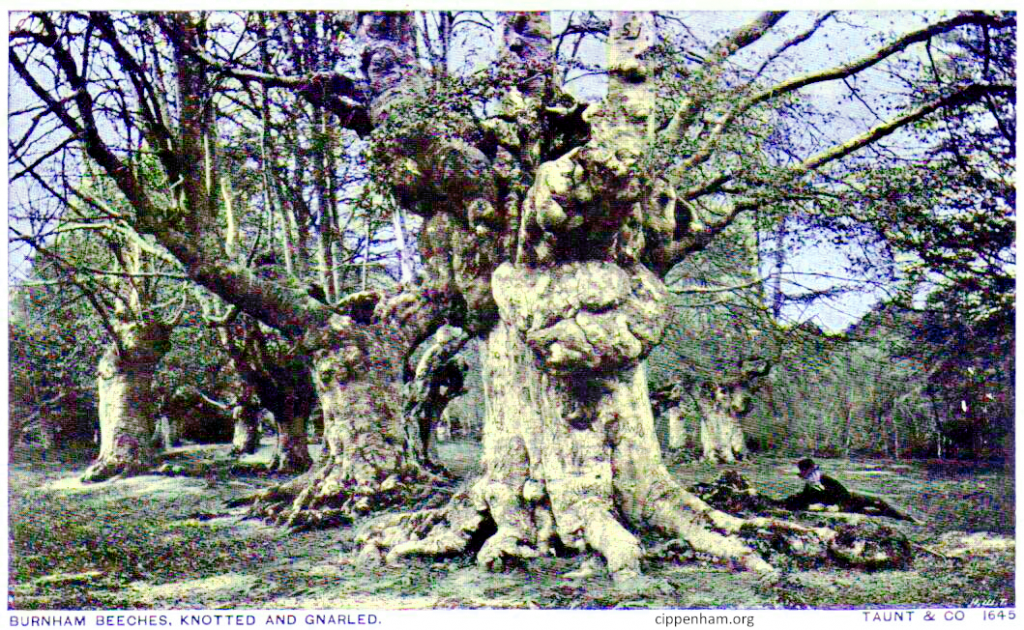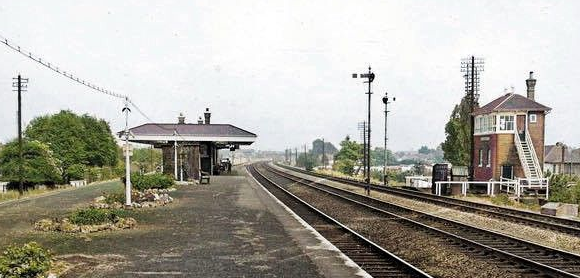Burnham Beeches, Burnham and Burnham Station, Cippenham
The opening of Burnham Beeches Station in 1899 let smoke-addled Londoners take day trips to a scenic ancient woodland in the Middle Thames Valley which had been specifically purchased by The Corporation. The origins of Burnham Beeches Wood are obscured but it was once Le Parc Burn, a royal deer-hunting park belonging to occasional Cippenham resident, alpha male, polymath, polyglot etc.. Richard, Earl of Cornwall, king of the Holy Roman Empire. Richard gifted the park in 1266 when he and his brother Henry III, King of England, founded Burnham Abbey convent. It was only coincidental that the year was the bicentenary of the Norman invasion.

Moving forward around 330 years, there are some clues that Shakespeare had familiarity with the surrounding area and the name of Burnham Beeches appears in Macbeth, perhaps as a subtle joke, given the play is set in 11th Century Scotland. Probably because of the archaic and bewitching look of this large wood, the Beeches has been used as a film location for movies such as Prince of Thieves and Harry Potter.
The station was renamed Burnham (Bucks) in 1930. In 1975, it became plain Burnham Station. For me the station was the starting-off point for so many adventures such as interrailing, parties and clubs in London, college, university, gigs, dates. This station was the start and end of 1000’s of journeys into the City that my dear old Dad did over the decades beginning in the 1960s.

Time marches on and in 2017 in preparation for the introduction of the Elizabeth line, the station became a part of TFL. See Burnham Station up in lights here in today’s Evening Standard. Viva Crossrail!
Contrary to what some may believe, Burnham Station is not in Burnham. It is in Haymill, and Haymill, of course, traditionally is a part of the Old Cippenham Village that sat below the comparatively Normanised village of Burnham. In contrast to Burnham it is interesting to note that there is no old stone church in Cippenham. Cippenham is not listed in the Domesday book, possibly because three thegns deceived the Normans into believing that Cippenham’s lands belonged to the manor of North Burnham.
It has been said that the name Cippenham originates from Cippa‘s homestead in archaic English. It is at least as likely that the origin of the name in fact is Danish and the Cippen part is related to Copen in the name of Copenhagen (which means harbour of the Copen people). A tribe of Danish settlers may have been able to navigate their longships up the Thames right into Cippenham as a tributary once flowed through the area, probably following a similar route to the recently created Jubilee River.
In the 1830’s the construction of the Great Western Railway sliced a side off Cippenham on Its Burnham border. This area, which took on the name of the Ay Mill watermill, was gradually assimilated into Burnham. Perhaps it is unsurprising that when a railway station was built in this area of Cippenham, its name contained “Burnham”.
Perhaps one day honour will be restored and Burnham Station will be renamed Slough West.
Related Links
Burnham Abbey Foundation Charter
Historical Curiosities (Registered Trademark 14/2/2022)
Article by Julianne Brookman





Does any one remember the ersatz station master with prominent glasses from the 80s, called Douglas? One night I saw him reach his hand into the side of a passing fast-train and he span round really fast like a top and landed flat, laughing but he was probably in some pain.
We will fight them in the beeches..
King John was Richard’s father, not his brother. It is also worth noting that the cognate of “Køben” in the Danish Copenhagen (København) in Old English is Ceappa (root of the name “Chapman”) rather than Cippa, so I am not convinced of the Danish origin. Old English and Danish are both Germanic, so it could be a cognate rather than a derivative.
Following your comment, the text is now corrected to say Henry III instead of John. I was just waiting to see who would spot that first.
I found your comment on the entomology very interesting, although I’m not sure where the baby swans fit in.
Juliette